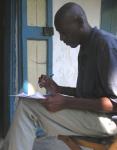InterIntel's Approach to Clean Energy in Haiti
 Below is a reader blog by Daniel Schnitzer, the Director of InterIntel. InterIntel is a small organization that specializes in innovative environmental management and alternative energy projects. Presently, InterIntel is building a clean energy store in Les Anglais and establishing both an educational management course and a Jatropha project in Coteaux. You can support InterIntel by donating, volunteering, or spreading the word about their work.
Below is a reader blog by Daniel Schnitzer, the Director of InterIntel. InterIntel is a small organization that specializes in innovative environmental management and alternative energy projects. Presently, InterIntel is building a clean energy store in Les Anglais and establishing both an educational management course and a Jatropha project in Coteaux. You can support InterIntel by donating, volunteering, or spreading the word about their work.
InterIntel: Fostering a Paradigm of Community-Based Solutions to Energy and Environmental Inequity
Daniel Schnitzer is Co-Founder and Director of Project Management at InterIntel, a 501(c)(3) non-profit charity based in Cambridge, MA. InterIntel works at the community level to improve energy services and environmental management with empowering, self-sustaining projects. They are presently organizing three projects on the southwestern peninsula of Haiti.
Back in August of 2008, during my first trip to Haiti, I was standing in front of the heaviest paperweight I had ever seen in my life. It was a perfectly new 170 kW diesel generator, connected to a non-functional streetlighting grid in a coastal town called Tiburon on the western tip of Haiti’s southern peninsula. My Haitian friends had told me that the local congressman invested tens of thousands of dollars and a great deal of effort into developing this project. But now that he had been re-elected, no one was sure whether this generator would ever give light to Tiburon. Electricite d’Haiti built the grid, but had since abandoned it.
This was just one of several personal encounters I had on that trip with symptoms of the governmental and market failure we read and hear about most often in the form of statistics like these: 800,000 children and 500,000 women die worldwide each year from respiratory disease caused by indoor air pollution from dirty biomass cooking fuel; in 2004, Tropical Storm Jeanne killed 3,000 people in Haiti; in 2008, Fay, Gustav, Hanna and Ike tore paths of destruction through Haiti, causing untold property damage and killing at least 800.
These symptoms are inequitable for the obvious reason that they disproportionately affect the poor, oppressed and the disenfranchised. InterIntel and many other organizations operate on the conviction that solutions for many of the root causes of symptoms like illness, disasters and poverty are readily available. Further, we believe that solutions can go one step further than economic development; they can foster social justice.
A common misconception is that the barriers to these solutions are high costs or that they simply do not exist. In reality, the barriers to these solutions are local availability, capital and knowledge resources. For example, InterIntel discovered through its surveys of 265 residents of Les Anglais, that the payback period on a $20US solar-powered LED lamp could be as little as three months, and typically at most fifteen months, based on the amount presently spent on kerosene and candle-based lighting. We can see here that cost is not the issue, and there are already several companies around the world producing inexpensive lamps specifically for rural communities.
People repeatedly told us they would gladly pay for solar lamps if only they were available, and such companies would gladly sell their products to them. Rather, the problem is local availability, and, for more sophisticated solar home systems, up-front costs and training to install and maintain these systems. InterIntel and members of the communities of Les Anglais and Coteaux have organized three projects which mitigate these barriers in order to meet the vocal demand for better energy and environmental options.
 Lighting Up the Haitian Peninsula
Lighting Up the Haitian Peninsula
Without any public electricity service, the people of Les Anglais have no choice but to use kerosene lanterns or candles for lighting and wood or charcoal for cooking. However, several private companies around the world have built businesses based on the $38 billion a year market spent by the world’s 1.6 billion people who lack access to electricity.
In Les Anglais, InterIntel is building a clean energy retail store to stock appropriate energy technologies like solar lamps, solar home systems, and efficient charcoal stoves. Of course, merely having a brick and mortar store is insufficient to engender the transition to cleaner energy sources. This project is characterized by three other key features - cooperation, training and microfinance - to foster this type of change.
 Human Safety as a Byproduct of Environmental Protection
Human Safety as a Byproduct of Environmental Protection
Haiti's deforestation is a result of over one hundred years of unsustainable agriculture and reliance on wood and charcoal for cooking fuel. This deforestation is a massive risk; causing erosion, soil nutrient loss, and deadly flooding during the hurricane season.
InterIntel is working with a cadre of committed individuals and groups, including forward thinking community members, the Municipality of Coteaux, the Students Association of Lycee Saint Pierre des Côteaux, and the Dean of Agriculture at the American University of the Caribbean, Haiti to educate students about the importance of the environment.
The core of the curriculum is a hands-on reforestation implementation and evaluation project. We are also working with the International Collaborative on Science, Education and the Environment and Robert Van Buskirk of Lawrence Berkeley National Laboratory to perform an environmental assessment using kite aerial photography.
 Making the Case for Sustainable Biofuel
Making the Case for Sustainable Biofuel
Jatropha is an inedible plant whose seeds contain oils with properties similar to diesel fuel. The plant, known as "Mestiyen" in creole, grows wild in Haiti, but is not cultivated despite its potential value. InterIntel has partnered with a bakery in Coteaux, which currently uses a diesel burner to heat its oven, to develop a pilot Jatropha plantation and oil-processing system with the end goal of replacing 100% of their diesel consumption with pure plant oil.
Ancillary benefits of this project include training individuals on Jatropha cultivation and processing, demonstrating the potential of Jatropha as a viable investment for farmers in Les Anglais and Coteaux and creating demand amongst users of diesel.
In order to fully implement these projects, InterIntel needs to raise a minimum of $20,000. We estimate our total costs for the year to be $80,000. Since receiving our 501(c)(3) status in mid-January, we have raised over $2,500 from individual donors and greatly appreciate donations of any size – even $25 is enough to purchase and ship two solar LED lamps to Les Anglais. Donations can be securely made through PayPal on our website.
If you are interested in volunteering, please visit our website to learn more about us and send an email. You can also support our cause by sending our website to friends, family and colleagues, or by becoming a “fan” of InterIntel on our facebook page. Thank you very much and do not hesitate to contact me with questions or for further information. We look forward to hearing from you.
Daniel
Add new comment